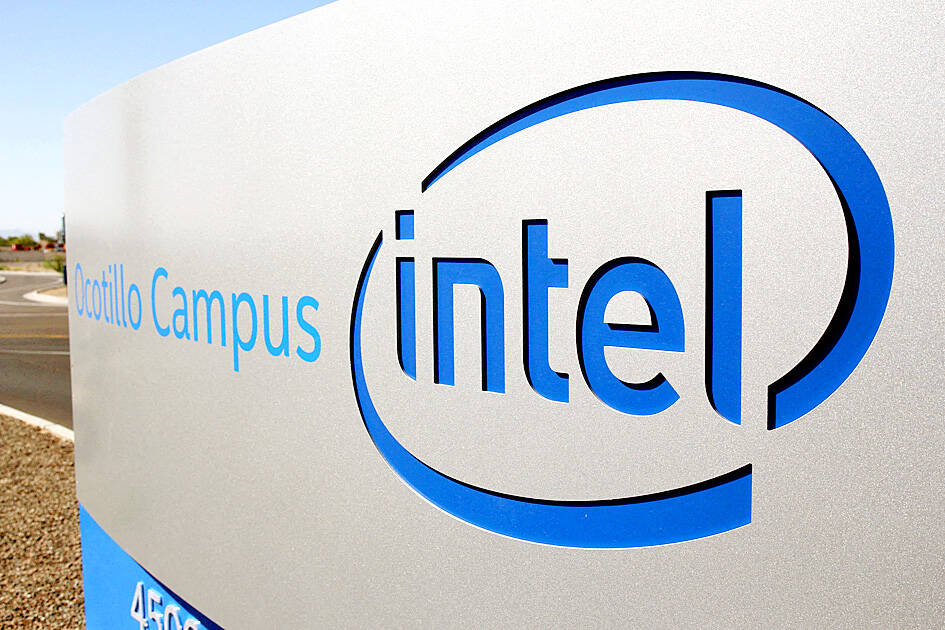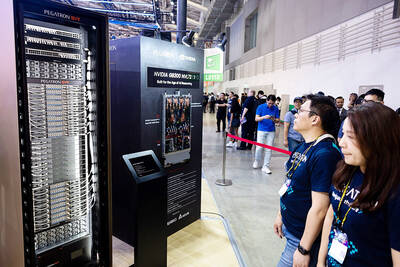Arm Holdings PLC approached Intel Corp about potentially buying the ailing chipmaker’s product division, only to be told that the business is not for sale, according to a source with direct knowledge of the matter.
In the high-level inquiry, Arm did not express interest in Intel’s manufacturing operations, said the source, who asked not to be identified because the discussions were private.
Intel has two main units: A product group that sells chips for personal computers, servers and networking equipment, and another that operates its factories.

Photo: Reuters
Representatives for Arm and Intel declined to comment.
Intel, once the world’s largest chipmaker, has become the target of takeover speculation since a rapid deterioration of its business this year. The company delivered a disastrous earnings report last month — sending its shares on their worst rout in decades — and is slashing 15,000 jobs to save money. It is also scaling back factory expansion plans and halting its long-cherished dividend.
As part of its turnaround efforts, Intel is separating the chip product division from its manufacturing operations. The move is aimed at attracting outside customers and investors, but it also lays the groundwork for the company to be split up — something Intel has considered, Bloomberg reported last month.
Arm, which is majority-owned by SoftBank Group Corp, makes much of its revenue selling chip designs for smartphones.
However, Arm chief executive officer Rene Haas has sought to broaden its reach outside of that industry. That has included a push into personal computers and servers, where its chip designs are going up against Intel’s.
Although Intel does not have the technological edge it once held, the Santa Clara, California-based company remains dominant in those markets.
Combining with Intel would help Arm’s reach and kick-start a move toward selling more of its own products. The company licenses technology and designs to customers, who then turn them into complete components. Its client list includes the biggest names in technology, such as Amazon.com Inc, Qualcomm Inc and Samsung Electronics Co.
Under Haas, the company has moved more in the direction of offering fully formed products — potentially putting it in competition with its licensees.
Arm, based in Cambridge, England, only has a fraction of Intel’s revenue. However, its valuation has soared since an initial public offering last year and now stands at more than US$156 billion.
Investors see the company as a beneficiary of the artificial intelligence spending boom, especially as it moves further into data center chips. Arm also has the backing of Japan’s SoftBank, which owns an 88 percent stake, potentially giving the company additional financial clout.
Intel, in contrast, has lost more than half its value this year and has a current market capitalization of US$102.3 billion. However, the company has other options to consider. Apollo Global Management Inc offered to make an investment in the company, Bloomberg reported this week. The firm indicated in recent days that it would be willing to put in as much as US$5 billion, marking a vote of confidence for CEO Pat Gelsinger.
Intel also plans to sell part of its stake in semiconductor maker Altera Corp to private equity investors. That business, which the chipmaker bought in 2015, was separated from Intel’s operations last year with the goal of taking it public.

AI TALENT: No financial details were released about the deal, in which top Groq executives, including its CEO, would join Nvidia to help advance the technology Nvidia Corp has agreed to a licensing deal with artificial intelligence (AI) start-up Groq, furthering its investments in companies connected to the AI boom and gaining the right to add a new type of technology to its products. The world’s largest publicly traded company has paid for the right to use Groq’s technology and is to integrate its chip design into future products. Some of the start-up’s executives are leaving to join Nvidia to help with that effort, the companies said. Groq would continue as an independent company with a new chief executive, it said on Wednesday in a post on its Web

RESPONSE: The Japanese Ministry of Finance might have to intervene in the currency markets should the yen keep weakening toward the 160 level against the US dollar Japan’s chief currency official yesterday sent a warning on recent foreign exchange moves, after the yen weakened against the US dollar following Friday last week’s Bank of Japan (BOJ) decision. “We’re seeing one-directional, sudden moves especially after last week’s monetary policy meeting, so I’m deeply concerned,” Japanese Vice Finance Minister for International Affairs Atsushi Mimura told reporters. “We’d like to take appropriate responses against excessive moves.” The central bank on Friday raised its benchmark interest rate to the highest in 30 years, but Bank of Japan Governor Kazuo Ueda chose to keep his options open rather than bolster the yen,

Even as the US is embarked on a bitter rivalry with China over the deployment of artificial intelligence (AI), Chinese technology is quietly making inroads into the US market. Despite considerable geopolitical tensions, Chinese open-source AI models are winning over a growing number of programmers and companies in the US. These are different from the closed generative AI models that have become household names — ChatGPT-maker OpenAI or Google’s Gemini — whose inner workings are fiercely protected. In contrast, “open” models offered by many Chinese rivals, from Alibaba (阿里巴巴) to DeepSeek (深度求索), allow programmers to customize parts of the software to suit their

Global server shipments are expected to surge to 15 million units next year, from 4 million units this year, with artificial intelligence (AI) servers accounting for about 30 percent, driven by massive capital spending by major cloud service providers, the Market Intelligence and Consulting Institute (MIC) said on Thursday last week. Major cloud service providers — including Google’s parent company Alphabet Inc, Microsoft Corp, Amazon.com Inc and Meta Platforms Inc — are projected to budget US$450 million for capital expenditure next year, up from US$400 million this year, MIC ICT [information and communications technology] Industry Research Center director Edward Lin